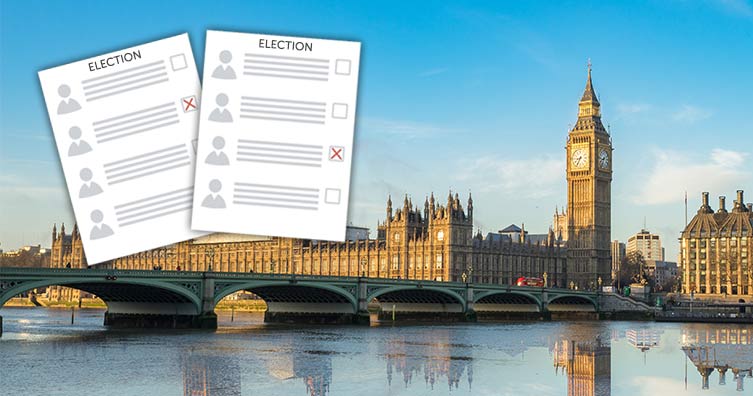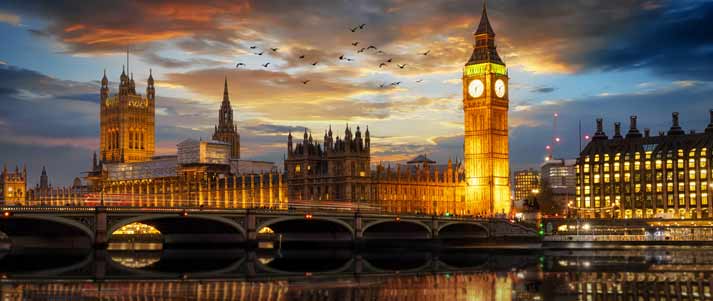Who should students vote for in the 2024 General Election?
Not sure who to vote for in the 2024 General Election? We've gone through all of the major parties' manifestos to find exactly what they're promising to do for students and young people.

Credit: Pajor Pawel (background), Photo Veterok (ballot papers) - Shutterstock
After what's felt like a lifetime of speculation, the General Election has finally been called.
Since then, all political parties have been campaigning up and down the country, selling their vision for the future. But as the coverage tends to focus on a handful of talking points, you might miss some of the other policies that could have just as big an impact on your life.
To help you make an informed decision on Thursday 4th July, we've read every major party's manifesto and picked out the policies that matter the most to you. Scroll through, or use the quick links below to see what they're pledging on each of the big topics.
2024 General Election policies
2024 General Election manifestos
We've summarised the major policies across all the main areas of interest below, but we can't cover everything. Manifestos can be incredibly detailed, with hundreds – if not thousands – of policies promised listed.
We've also only covered parties standing across a significant number of seats and who the polling suggests have a realistic chance of winning at least one seat.
If you'd like to read each party's manifesto (or, in the case of Reform UK, their "contract") in more detail, you can find them below:
- Conservatives
- Democratic Unionist Party (DUP) (standing in Northern Ireland only)
- Green Party (of England and Wales)
- Labour
- Liberal Democrats
- Plaid Cymru (standing in Wales only)
- Reform UK
- Scottish National Party (SNP) (standing in Scotland only)
- Sinn Féin (standing in Northern Ireland only).
Why are only some policies featured below?
We've only looked at the areas most relevant to students and young people. There might be some overlap between a few categories (e.g. many Green Party policies have an environmental aspect), so we'd encourage you to read through them all.
It's also worth noting that we've gone strictly by what's covered in the manifesto, and not what's been mentioned in interviews elsewhere. Although these comments may affect policy later on, the manifesto is the most reliable indicator of what a party will do in government.
Where possible, we've also tried to include clear and specific policies only. Where a manifesto contains some ambiguity, or presents an opinion, we've included the party's exact wording in quotation marks.
With that in mind, as the election cycle continues, we'd strongly recommend you check out some independent fact-checking tools like Full Fact or BBC Verify. They do incredible work investigating the claims made by parties from across the political spectrum, and are super useful for knowing exactly what you're voting for!
University and tuition fee policies

Credit: Matej Kastelic – Shutterstock
We're a student money website, so of course we're starting with each party's promises on tuition fees, Student Loans and universities.
 Conservatives
Conservatives
- Close university courses with the "worst outcomes for their students", defined as courses with high drop-out rates or that "leave students worse off" than if they hadn't gone to uni.
- Work with universities to ensure students get the contact hours they're promised.
 DUP
DUP
- Not directly addressed in their manifesto.
 Green Party
Green Party
- Restore Maintenance Grants and "fully fund" every student.
- Abolish undergraduate tuition fees.
- In the long term, seek to cancel all graduate debt.
 Labour
Labour
- Create a "secure future for higher education".
- Support "the aspiration of every person who meets the requirements and wants to go to university".
 Liberal Democrats
Liberal Democrats
- "Immediately" restore Maintenance Grants "for disadvantaged students".
- Rejoin the EU's Erasmus+ programme, expanding opportunities to study abroad.
- Review the state of higher education finance to consider any necessary reforms.
- Ensure there's no more "retrospective raising of rates" on Student Loans.
- Introduce a Student Mental Health Charter.
 Plaid Cymru
Plaid Cymru
- Work to increase the number of students at Welsh universities.
- Support flexible pathways into higher education, including recognition of "learning achieved elsewhere".
- Work with universities to make higher education free for all to access.
- Introduce a Lifelong Learning Allowance in Wales, including a £5,000 grant to every person aged over 25 to train or retrain.
 Reform UK
Reform UK
- Scrap interest on Student Loans.
- Abolish Student Loan debt for doctors, nurses and "medical staff", "pro rata" over 10 years of NHS service.
- Extend Student Loan repayment period to 45 years.
- Ban international students from bringing dependents to the UK, and ensure only those with "essential skills" can remain in the country.
- Introduce minimum entry standards.
- Restrict the number of undergraduate places available.
- Require universities to offer two-year undergraduate courses.
- Cut funding to universities that "undermine free speech".
 Scottish National Party
Scottish National Party
- Continue to offer free university tuition in Scotland.
 Sinn Féin
Sinn Féin
- Not directly addressed in their manifesto.
NHS and healthcare policies

The NHS is a major focus for all parties at this election, so here's what they have to say about funding the health service and introducing other healthcare policies:
 Conservatives
Conservatives
- Recruit 92,000 more nurses and 28,000 more doctors into the NHS.
- Expand Pharmacy First (a scheme that allows you to visit a pharmacy for some issues, rather than a GP), including to cover contraception and chest infection treatment, "freeing up 20 million GP appointments a year".
- Build or modernise 250 GP surgeries.
- Increase the planned expansion of NHS Talking Therapies by a further 50%.
- Implement the recommendations of the Cass Review, which looked at access to NHS gender services for children and young people.
 DUP
DUP
- Campaign for Northern Ireland to receive "hundreds of millions of pounds" extra in NHS funding every year.
- Foster "large-scale partnerships" with "national independent providers and not-for-profit organisations".
- Commission a practitioner health scheme, offering support to medical professionals with mental health and addiction problems.
- "Firmly oppose" moves to legalise assisted dying.
 Green Party
Green Party
- Invest £20 billion over the next five years to build and repair hospitals.
- Stand against the privatisation of the NHS.
- Ensure that everyone who needs an NHS dentist has access to one.
- Support the call from junior doctors for pay restoration (restoring the value of pay in line with inflation since 2008/09).
- Put mental healthcare on an "equal footing" with physical healthcare, and ensuring anyone who needs it can reach mental health therapies within 28 days.
- Support changing the law on assisted dying, allowing people with terminal illnesses to choose their lives "to avoid prolonging unnecessary suffering".
 Labour
Labour
- Add 40,000 new appointments every week.
- Allow neighbouring hospitals to share waiting lists and pool resources to reduce the backlog.
- Double the number of CT and MRI scanners to catch cancer and other conditions earlier.
- Recruit 8,500 new mental health staff.
- A "Dentristy Rescue Plan" to provide 700,000 more urgent appointments and recruit new dentists in the areas that need them the most.
 Liberal Democrats
Liberal Democrats
- Hire 8,000 new GPs, ensuring everyone can see a GP within seven days, or within 24 hours if there's an urgent need.
- Guarantee access to an NHS dentist for everyone needing emergency and urgent care.
- Establish walk-in "mental health hubs" for young people in every community, and introduce regular check-ups at the key points in people's lives when they're most vulnerable to mental health issues.
- Extend young people's mental health services up to the age of 25, to ease the transition into adulthood.
- Ensure 100% of patients start cancer treatment within 62 days of an urgent referral.
- Develop a strategy to support immunocompromised people in the post-pandemic world.
 Plaid Cymru
Plaid Cymru
- Recruit 500 new GPs across Wales over the next 10 years.
- Recruit more nurses and offer more flexible contracts, allowing a greater work-life balance.
- Provide appropriate support for those affected by long COVID.
- Open a new dental school in Wales, helping to train more dentists for the country.
- Pay social care workers at least £1 more than the hourly Real Living Wage, amounting to at least a £1,800 pay rise for a full-time worker.
- Ensure support is made available "as soon as an individual presents themselves as neurodiverse".
 Reform UK
Reform UK
- Introduce a 0% basic tax rate for three years for all frontline NHS and social care staff.
- "Harness" the use of independent and non-profit health provision.
- Provide 20% tax relief on all private healthcare and insurance.
- Give NHS patients a voucher for free private treatment if they can't see a GP within three days, a consultant within three weeks, or have an operation within nine weeks.
- Charge people who fail to attend a medical appointment without giving notice.
- Hold a public inquiry into excess death rates and "vaccine harms".
 Scottish National Party
Scottish National Party
- Introduce a "Keep the NHS in Public Hands" bill in Westminster to "protect the NHS" from any privatisation measures.
- Boost NHS spending by a minimum of £10 billion per year, generating an extra £1 billion per year for NHS Scotland.
- Increase investment in NHS England staff pay by at least £6 billion, delivering £600 million for NHS Scotland.
 Sinn Féin
Sinn Féin
- Create an all-Ireland national health service.
Environmental and energy policies

Credit: Willy Barton – Shutterstock
The environment continues to be a focus for all parties, although how each party wants to deal with it – and how urgent they feel the issues are – varies quite a bit. Here are some of the major policy commitments:
 Conservatives
Conservatives
- Reach net zero by 2050.
- Continued licensing for oil and gas production from the North Sea.
- Reverse the ULEZ expansion in London.
- Open new gas power stations.
- Treble the UK's offshore wind capacity.
- Build the UK's first two carbon capture and storage clusters.
- Increase the use of nuclear energy by approving "two new fleets of Small Modular Reactors" and halving the time taken to approve near reactors.
 DUP
DUP
- Reach net zero by 2050.
- Support "targeted initiatives" to prevent pollutants from entering waterways.
- Push for "enforcement action" for those who "repeatedly or deliberately" pollute rivers or lakes.
- Double Northern Ireland's low-carbon and renewable energy economy.
- Aim to reduce the "annual material footprint per person across the UK".
 Green Party
Green Party
- Aim for a zero-carbon society "more than a decade ahead of 2050".
- Push for wind to provide around 70% of the UK's energy by 2030
- Ban new oil and gas licences, and end subsidies for the oil and gas industries.
- Introduce a tax on all fossil fuels, regardless of whether they were produced here or imported.
- Cease the development of new nuclear power stations.
- Nationalise water companies and the "Big 5 retail energy companies".
- Ban domestic flights for journeys that take less than three hours by train.
- Push for "a substantial increase in productive forestry" as well as extra woodland.
 Labour
Labour
- Set up Great British Energy, a publicly-owned company generating clean energy.
- End the use of fossil fuels to generate electricity by 2030, driven by plans to double onshore wind, quadruple offshore wind, and triple solar power.
- Invest in carbon capture and storage.
- No new coal licences, and a permanent ban on fracking.
- Restore plans to ban the sale of new petrol and diesel cars from 2030.
- Plant "millions of trees" and create new woodlands.
- "Put failing water companies under special measures to clean up" polluted waterways.
 Liberal Democrats
Liberal Democrats
- Reach net zero by 2045.
- Launch a 10-year "emergency upgrade programme" to provide free insulation and heat pumps for those on low incomes, and ensure all new homes are "zero-carbon".
- Expand incentives for households to install solar panels.
- Ensure that by 2030, 90% of the UK's electricity is generated from renewable sources.
- Ban domestic flights where "a direct rail option" would take less than two and a half hours.
- Restore the requirement for every new car and small van sold from 2030 to be "zero-emission".
- Maintain the ban on fracking and introduce a ban on new coal mines.
- Plant at least 60 million trees a year.
- Set legally binding targets to prevent water companies from dumping sewage into "bathing waters and highly sensitive nature sites" by 2030.
 Plaid Cymru
Plaid Cymru
- Reach net zero in Wales by 2035, and reverse the decline of biodiversity by 2030.
- Set higher environmental targets for water quality in Wales.
- Oppose the development of new nuclear power stations.
- Oppose new licences for oil and gas drilling.
- Maintain the ban on fracking.
 Reform UK
Reform UK
- Scrap all net-zero targets.
- Scrap renewable energy subsidies.
- Fast-track licences for North Sea oil and gas extraction.
- Fast-track "clean nuclear energy" with Small Modular Reactors.
- "Increase and incentivise ethical UK lithium mining for electric batteries, combined cycle gas turbines, clean synthetic fuel, tidal power and explore clean coal mining."
- Ban ULEZ Clean Air Zones and Low Traffic Neighbourhoods.
 Scottish National Party
Scottish National Party
- Reach net zero in Scotland by 2045.
- Encourage the UK government to spend at least £28 billion per year on the "green economy".
- Rule out new nuclear power plants in Scotland.
- Only issue new oil and gas licences on a "rigorously evidence-led, case-by-case basis".
- Ban new coal licences.
 Sinn Féin
Sinn Féin
- A "fair and just transition" to a carbon-neutral economy.
Housing policies

Credit: Manchesterphotos - Wikimedia
One thing all parties seem to agree on is that there aren't enough homes in the UK. And with 47% of respondents in our survey telling us they're worried about the student housing shortage, we know you're feeling it too.
Here's how each party plans to reform housing, including measures to improve conditions for renters:
 Conservatives
Conservatives
- Build 1.6 million homes over the next five years.
- Fast-track housebuilding on previously developed land in urban areas, and increase density levels in inner London.
- Retain their "cast-iron commitment" to the green belt (areas of countryside protected from urbanisation).
- Permanently increase the first-time-buyer stamp duty threshold to £425,000.
- Expand access for first-time buyers to mortgages with 5% deposits.
- Pass a Renters Reform Bill to "deliver fairness in the rental market for landlords and renters".
 DUP
DUP
- Not directly addressed in their manifesto.
 Green Party
Green Party
- Provide 150,000 new social homes every year, and end "right-to-buy" to ensure properties remain in public ownership.
- Give local authorities the power to introduce rent controls.
- Push to end no-fault evictions, and introduce long-term leases.
- Give tenants the right to demand energy efficiency improvements in their homes.
- Campaign to require all new homes to include solar panels and low-carbon heating systems.
- Protect the green belt.
 Labour
Labour
- Build 1.5 million homes over the next five years.
- Prioritise and fast-track building on previously developed land.
- Protect the green belt.
- Introduce a "permanent, comprehensive mortgage guarantee scheme" (ensuring access to mortgages with a 5% or 10% deposit) for first-time buyers.
 Liberal Democrats
Liberal Democrats
- Build 380,000 new homes, including 150,000 social homes, every year.
- Ban no-fault evictions.
- Make three-year tenancies the default option.
- Create a national register of licensed landlords.
- Introduce a "Rent to Own" model for social housing, whereby rent payments give tenants an increasing stake in the property and eventually own it after 30 years.
- Give local authorities the power to increase council tax on second homes by up to 500%.
 Plaid Cymru
Plaid Cymru
- Expand existing initiatives allowing local authorities to build their own social housing.
- Introduce a "Right to Adequate Housing" bill, including powers to introduce rent controls.
- Reform the planning system to reflect the types and sizes of housing required in a local area.
 Reform UK
Reform UK
- Fast-track planning and provide tax incentives for building on previously developed land.
- Prioritise "local people" for social housing, with foreign nationals placed at "the back of the queue".
- Improve the "monitoring, appeals and enforcement process" for rental complaints.
 Scottish National Party
Scottish National Party
- Push for an annual increase in the rate of Local Housing Allowance.
- Reintroduce a "simplified Help to Buy ISA scheme" for first-time buyers.
- Demand the UK government restore £1.3 billion of funding to Scotland to help tackle "the housing emergency".
 Sinn Féin
Sinn Féin
- Create a "sustainable housing system".
Jobs, benefits and taxation policies

Credit: dokurose – Shutterstock
As it always seems to do, tax has dominated much of the discussion in this election. This is what each party is promising to do, as well as their plans for benefits and jobs:
 Conservatives
Conservatives
- Cut National Insurance by a further 2%, and entirely for the self-employed, as part of a long-term ambition to abolish the tax altogether "when financial conditions allow".
- Maintain the National Living Wage at two-thirds of median earnings.
- Give working parents 30 hours of free childcare every week, for children aged nine months up to the age at which they start school.
- Reform the disability benefits system so it's "better targeted" and "[reflects] people's genuine needs", aiming to "stop the number of claims rising unsustainably".
- Merge all other types of benefits into Universal Credit.
 DUP
DUP
- Scrap the two-child benefit cap for three- and four-child households.
- Oppose the freezing of the personal tax-free allowance and higher tax rate threshold.
- Support uprating benefits in line with inflation.
- Maintain the National Living Wage at two-thirds of median earnings.
- Reintroduce financial incentives for businesses hiring "young apprentices at risk of long-term unemployment".
 Green Party
Green Party
- Restore the value of disability benefits with an immediate uplift of 5%.
- Increase Universal Credit and other benefits by £40 per week.
- Abolish the two-child benefit cap.
- Introduce an annual wealth tax of 1% on assets above £10 million and 2% over £1 billion.
- Increase the minimum wage to £15 per hour and pay it to all workers, regardless of their age.
- Introduce a maximum 10:1 pay ratio for all private- and public-sector organisations, meaning the highest-paid individual in a company can only be paid at most 10 times as much as the lowest-paid person.
- Repeal "anti-union legislation" and replace it with a "Charter of Workers' Rights".
- Ensure equal rights for all workers, including those on zero-hours contracts and those working in the gig economy.
 Labour
Labour
- No increase to taxes on "working people", including no increases to the rates of National Insurance, income tax or VAT.
- Ensure the minimum wage is a "genuine living wage" and pay it to all workers, regardless of their age.
- Ban "exploitative zero-hours contracts".
- Support more disabled people and those with health conditions into work.
- Establish a "guarantee of access to training, an apprenticeship or support to find work" for all 18 – 21-year-olds.
 Liberal Democrats
Liberal Democrats
- Scrap the lower rate of minimum wage for apprentices and ensure they're paid at least the National Minimum Wage.
- Set a 20% higher minimum wage for people on zero-hours contracts at times of "normal demand", to compensate for the uncertainty of fluctuating hours.
- Give all agency and zero-hours workers the right to request a fixed-hours contract after 12 months.
- Increase the tax-free personal allowance "when the public finances allow".
- Give everyone a right to "flexible working".
- Scrap the two-child benefit cap.
- Reduce the wait for the first Universal Credit payment from five weeks to five days.
 Plaid Cymru
Plaid Cymru
- Increase Child Benefit by £20 per week.
- Push for the Welsh government to be given the power to set income tax bands and thresholds in Wales.
- Implement a living wage for apprenticeships, and help colleges offer support such as free travel and meals.
- Ban employers from forcing workers onto zero-hours contracts
- Give workers a "right not to be routinely contacted about work outside normal working hours".
- Push to give all secondary school students in Wales free meals.
- Scrap the two-child benefit limit.
- Support pilot schemes offering a universal basic income.
 Reform UK
Reform UK
- Increase the tax-free personal allowance to £20,000, and the higher tax rate threshold to £70,000.
- Introduce a "transferrable marriage tax allowance" whereby either spouse pays no tax on the first £25,000 of their income.
- Remove the benefits of all job-seekers who fail to find employment within four months, or refuse two or more offers.
- Set a five-year residency and employment requirement for anyone who wishes to claim benefits in the UK.
- Increase the rate of National Insurance for employers to 20% for "foreign workers", excluding "essential [...] health and care workers" and businesses with five staff members or fewer.
 Scottish National Party
Scottish National Party
- Scrap the two-child benefit cap.
- Demand an "essentials guarantee" to ensure everyone can afford necessities like food and utilities.
- Ban "exploitative zero-hours contracts".
- Increase the minimum wage to "at least the level of the National Living Wage" and pay it to all workers, regardless of their age.
 Sinn Féin
Sinn Féin
- Continue pushing for "the transfer of fiscal powers" to the Northern Irish government, potentially allowing control over their own income tax rules.
Equality and human rights policies

Credit: nito – Shutterstock
From issues related to gender and sexuality, to policies on racial equality and disability, this is what the major parties are promising to do:
 Conservatives
Conservatives
- Introduce legislation to "clarify that the protected characteristic of sex [...] means biological sex".
- Introduce legislation so an individual can legally only have one sex.
- Ensure schools and teachers follow guidance on how to support gender-questioning students, including a requirement to inform and involve parents in any decisions.
 DUP
DUP
- Continue to be "unashamedly pro-life" and "oppose the radical abortion laws" introduced in Northern Ireland.
- Support a "wide-ranging audit of central and local government facilities" to ensure they're accessible to those with disabilities.
- Collaborate with the Inclusive Mobility and Transport Advisory Committee (IMTAC) on future transport projects.
 Green Party
Green Party
- Support self-ID, meaning trans and non-binary people can legally be recognised in their chosen gender.
- Change the law so an 'X' gender marker can be added to passports for any non-binary or intersex people who wish to do so.
- End the "spousal veto" so trans people can receive a gender recognition certificate without needing the permission of their partner.
- Make misogyny a hate crime across the UK.
- Require all large- and medium-sized companies to conduct equal pay audits, and redress any inequality uncovered across pay and recruitment.
- Defend the Human Rights Act.
 Labour
Labour
- "Modernise, simplify, and reform" the current gender recognition process, while retaining "the need for a diagnosis of gender dysphoria from a specialist doctor".
- Deliver a trans-inclusive ban on conversion practices.
- Reduce the gender pay gap.
- Introduce disability and ethnicity pay gap reporting for large employers, and introduce legislation to protect the equal pay rights of both groups.
 Liberal Democrats
Liberal Democrats
- Make misogyny a hate crime.
- Give every disabled person the right to work from home where possible.
- Ban all forms of conversion therapies and practices.
- Increase the number of refuges and rape crisis centres.
- End the gender price gap, where women are sometimes charged more than men for "practically identical products or services".
- Provide free access to period products to anyone who needs them.
- Reform the gender recognition process to remove the "spousal veto" and the need for medical reports, and to recognise non-binary identities in law.
- Require large employers to "monitor and publish data" on "gender, ethnicity, disability, and LGBT+ employment levels, pay gaps and progression".
- Introduce a comprehensive "Race Equality Strategy", including a reduction in Stop and Search and action to address the "disproportionately high" maternal death rates among Black women.
 Plaid Cymru
Plaid Cymru
- End conversion therapies and practices.
- Try to secure the powers for the Welsh government to implement a "simplified, demedicalised gender self-identification system".
- Support research into the barriers faced by minority ethnic groups in accessing healthcare, and how to address them.
- Introduce the United Nations Convention on the Rights of Disabled People into UK law.
 Reform UK
Reform UK
- Ban "transgender ideology" in primary and secondary schools, explained as "no gender questioning, social transitioning or pronoun swapping".
 Scottish National Party
Scottish National Party
- "Protect and enhance the rights of LGBTI" people.
- Oppose any attempt by the UK government to withdraw from the European Convention on Human Rights (ECHR) or change the Human Rights Act.
- Demand that employment rights be devolved to the Scottish government, allowing them to "take action to close the gender pay gap".
 Sinn Féin
Sinn Féin
- Aim for "a society that values and celebrates the diversity of our identities, religious or none, sexual orientation, gender, disability, age, or ethnic origin".
- Call for "parity of esteem for Irish culture and language as provided for in the Good Friday
Agreement."
Other policies of interest

Credit: Sven Hansche - Shutterstock
Some policies you might find interesting – including some of the biggest talking points of the election so far – don't quite fit into any of the categories above, so we've listed a few more here.
And just a note to say that if we haven't listed a party's policy on the situation in Gaza, it's because they haven't addressed it in their manifesto.
 Conservatives
Conservatives
- Recognise the Palestinian state "at a time that is most conducive to the peace process", and "staunchly stand behind Israel's right to defend itself".
- Introduce mandatory National Service for all 18-year-olds, with a choice between volunteering or a military placement.
- Reintroduce the "Tobacco and Vapes Bill", banning anyone born on 1st January 2009 or later from ever buying cigarettes, and ending the sale of single-use vapes.
- Begin monthly flights "permanently removing illegal migrants to Rwanda [...] starting this July".
 DUP
DUP
- Explore measures to "tackle the harm caused by smoking and vaping", including the possibility of raising the age of sale to 21.
- Support the abolition of the TV Licence and its replacement with a subscription-based service.
- Back increased spending to "safeguard the UK's nuclear deterrent".
 Green Party
Green Party
- Recognise the state of Palestine and push for an "immediate and permanent bilateral ceasefire" in Gaza.
- Use an "evidence-based approach" to reform the UK's drug laws, allowing the country to move towards a "legally regulated market".
- End the need for voter ID and reduce the voting age to 16.
- Replace the current first-past-the-post electoral system, used for parliamentary and council elections, with a "fair and proportional voting system".
- Abolish the Trident nuclear programme and remove all foreign nuclear weapons from the UK.
 Labour
Labour
- Recognise the Palestinian state "as a contribution to a renewed peace process" and a two-state solution.
- Charge VAT on private school fees.
- Prevent "the next generation" from legally buying cigarettes.
- Reduce the voting age to 16.
- Introduce new consumer protections on ticket resales.
- Establish an independent regulator to "ensure financial sustainability of football clubs in England" and block teams from joining a European Super League.
 Liberal Democrats
Liberal Democrats
- Recognise the state of Palestine and push for an "immediate bilateral ceasefire" in Gaza.
- Introduce a legal and regulated market for cannabis.
- Repeal the "draconian anti-protest laws" introduced by the current government.
- End the need for voter ID and reduce the voting age to 16.
- Replace the current first-past-the-post electoral system with proportional representation.
- Rejoin the European Single Market, and retain the long-term ambition of rejoining the EU.
 Plaid Cymru
Plaid Cymru
- Continue to recognise the state of Palestine and call for an "immediate ceasefire" in Gaza.
- Retain a belief in Welsh independence.
- Push for the UK to rejoin the European Single Market.
- Oppose the renewal of the Trident nuclear programme.
 Reform UK
Reform UK
- Scrap the TV Licence.
- Make St George's Day and St David's Day national holidays.
- Replace the current first-past-the-post electoral system with proportional representation.
- Offer 20% tax relief on independent school fees.
- Freeze "non-essential immigration".
 Scottish National Party
Scottish National Party
- Recognise the state of Palestine and "demand an immediate ceasefire in Gaza".
- Begin "immediate negotiations" with the UK government on Scottish independence if the SNP win the majority of Scottish seats.
- Rejoin the EU if Scottish independence is achieved.
- End the need for voter ID and reduce the voting age to 16.
- Scrap the Trident nuclear programme.
- Decriminalise drugs for personal use.
 Sinn Féin
Sinn Féin
- Continue the party's calls for "a free and independent Palestinian state" and an "immediate ceasefire".
- Demand the Irish and British governments set a date for a referendum on Irish unity.
So now you know what each party is promising to do, make sure you get out and vote on Thursday 4th July!
Make sure you're following us on Instagram and TikTok for more election updates and what it all means for you.








